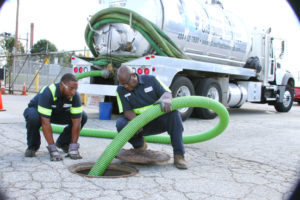
There tend to be many grey areas when it comes to proper grease trap cleaning and maintenance, but what methods actually work? And which ones do more harm than good? Ensuring that your company keeps up with grease trap guidelines will ensure the longevity of your system and save your company time and money in the long run. To help narrow down those helpful vs. harmful maintenance tips, we’ve curated a list of do’s and don’ts when it comes to taking care of your grease trap between scheduled cleanings.
Do Regularly Check on Your Grease Trap
Over time, your grease trap will be subject to general wear and tear. While it might not seem like a big deal to regularly check in on your grease trap, doing so could prevent any severe damage. If you notice that the grease within your trap isn’t collecting as it should, then there’s a good chance it’s time to have a thorough maintenance check to inspect and repair any damages.
Don’t Pour Boiling or Hot Water into Your Grease Trap
While this may seem like a quick fix to grease buildup, it should never be practiced in a facility with a commercial grease trap. Once you pour boiling water into the grease trap, it will liquefy grease within the system. Not only will this make it easier for grease buildup to escape from the trap, but if it reaches the local sewer system it could put your business in some serious trouble with the EPA. Next time you think about pouring boiling or hot water into the grease trap, save the trouble and hire a professional to perform a thorough cleaning.
Do Be Sure the Hired Company Properly Disposes of Your Grease
As a grease-producing facility, you have a cradle-to-grave liability to ensure that your grease is appropriately disposed of and treated at the right facility. Unfortunately, there are many companies out there that make promises to transport and dispose of waste, like grease, that they can’t actually keep— resulting in illegal dumping. At Environmental Remedies, we not only perform top-of-the-line grease trap cleanings, but we also handle, process, and dispose of grease waste via our on-site waste treatment system.
Don’t Use Solvents to Clean Your Grease Trap
Often people turn to solvents and chemicals to clean their grease trap, but doing so could cause more harm than good to your system. Chemicals will destroy the active enzymes meant to break down grease within your grease trap. Not only will this result in excess grease buildup, but it can also ruin the trap itself. To avoid any damage, it’s best to leave grease trap cleaning to the professionals.
Do Have a Professional Perform Line Jetting
Over time, a mixture of grease and debris can form within the pipe walls of your grease trap system, resulting in a slowed or even halted flow. To help keep your grease trap in top working condition over time, having an occasional line jetting performed will help prevent any additional damage to your system. Looking to hire a professional to perform line jetting? Get started by requesting a quote.
Don’t Ignore Grease Trap Problems
Putting off any problems, both big and small, can cost you down the road. If you notice any issues arise within your grease trap system, don’t assume that the issue will fix itself. Putting it off will only escalate the problem – requiring a much bigger fix later on.
Do Get Your Grease Trap Cleaned Regularly
We’ve emphasized this many times, but we’ll say it again— it’s imperative that you regularly clean your grease trap. Avoiding to do so can result in a variety of issues for both your grease trap and your business. While it is recommended that your grease trap be cleaned every three months to prevent buildup, some traps require more maintenance than others to prevent overflow and potential fines. Hiring a professional will ensure that your grease trap is cleaned and maintained within federal and state laws.
Don’t Allow Employees to Clean Your Grease Trap
We get it, times are tough, and you often look for the easiest ways to cut costs. Even amidst budget cuts, it’s still important to have your grease trap cleaned regularly. Employees should never be tasked with cleaning a grease trap. Even well-meaning employees can damage your system, so it’s best to leave the task to the professionals.
Do Educate Your Employees
As an employer, it’s your responsibility to train and educate your employees about the procedures and safety measures regarding your grease trap system. To keep your grease trap in top working condition, employees must know how it works and how to take care of it properly. Neglecting to do so could result in damage or injury— placing the liability on you.
When it comes to caring for your grease trap, it’s best to trust the experts. Environmental Remedies has both the knowledge and tools needed to help keep your grease trap clean and your business on track. Looking to schedule your next grease trap cleaning? Feel free to check out our info page, or get started by requesting a quote!
